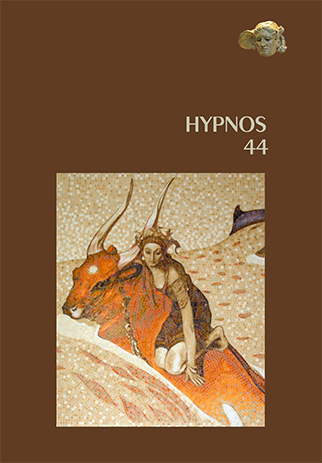O que está implicado na ação? Algumas considerações a propósito da leitura foucaultiana do De ira III, 36
Keywords:
Sêneca, Foucault, Exame de consciência, AçãoAbstract
A análise foucaultiana do exame de consciência presente em De ira III, 36 é orientada pela tentativa de distinguir o exame estoico daquele encontrado posteriormente no cristianismo. Seu argumento principal é que o exame senequiano tem um caráter eminentemente administrativo. Pretendo mostrar que a análise foucaultiana não dá conta devidamente da natureza da ação, dos fins desta e dos princípios de conduta, na filosofia estoica. A distinção entre skopos e telos permitirá um entendimento mais adequado da natureza dos fins da ação, no estoicismo. Por fim, procurarei mostrar por que os princípios ou regras de conduta não podem ser entendidos apenas como instrumentos utilizados ao agir, pois concernem à natureza da alma daquele que age.References
CÍCERO. As últimas fronteiras do bem e do mal. In: Textos Filosóficos. Trad. J. A. Segurado e Campos. Lisboa: Fundação Calouste Gulbenkian, 2012, p. 245-526.
ÉPICTÈTE. Entretiens. Trad. Émile Bréhier. In: SCHUHL, Pierre-Maxime (ed.). Les Stoïciens. Paris: Gallimard, 1962, p. 801-1105.
FOUCAULT, Michel. About the beginnings of the Hermeneutics of the Self: two lectures at Dartmouth. IN: Political Theory, v. 21, n. 2, p. 198-227, 1993.
FOUCAULT, Michel. Discours et vérité précédé de La parrêsia. Paris: Vrin, 2016.
FOUCAULT, Michel. Du gouvernement des vivants. Paris: Seuil/Gallimard, 2012a.
FOUCAULT, Michel. Histoire de la sexualité III: Le souci de soi. Paris: Gallimard, 1984. (Collection Tel).
FOUCAULT, Michel. L'écriture de soi. In: Dits et écrits II, 1976-1988. Paris: Gallimard, 2001a, p. 1234-1249.
FOUCAULT, Michel. Les techniques de soi. In: Dits et écrits II, 1976-1988. Paris: Gallimard, 2001b, p. 1602-1632.
FOUCAULT, Michel. L'herméneutique du sujet. Paris: Seuil/Gallimard, 2001c.
FOUCAULT, Michel. Mal faire, dire vrai: fonction de l'aveu en justice. Louvain: Presses Universitaires de Louvain, 2012b.
GOLDSCHMIDT, Victor. Le système stoïcien et l’idée de temps. Paris: Vrin, 2006.
HADOT, Pierre. Introduction aux “Pensées” de Marc Aurèle: La Citadelle intérieur. Paris: Fayard, 1997. (Le Livre de Poche).
INWOOD, Brad. Moral judgement in Seneca. In: Reading Seneca: Stoic Philosophy at Rome. Oxford: Clarendon Press, 2005, p. 201-223.
INWOOD, Brad. Seneca and psychological dualism. In: BRUNSCHWIG, Jacques; NUSSBAUM, Martha C. (ed.). Passions & Perceptions: studies in Hellenistic philosophy of mind. Cambridge: Cambridge University Press, 1993, p. 150-183.
KIDD, I. G. Moral actions and rules in Stoic ethics. In: RIST, John M. (ed.). The Stoics. Berkeley: University of California Press, 1978, p. 247-258.
LONG, A. A. A ética: continuidades e inovações. In: GOURINAT, J.-B.; BARNES, J. (orgs.). Ler os estoicos. Trad. Paula S. R. C. Silva. São Paulo: Loyola, 2013, p. 197-220.
NUSSBAUM, Martha C. Seneca on anger in public life. In: The therapy of desire: theory and practice in Hellenistic ethics. Princeton: Princeton University Press, 1994, p. 402-438.
RIST, John M. Stoic philosophy. Cambridge: Cambridge University Press, 1977.
SENECA. On Benefits. Trad. Miriam Griffin e Brad Inwood. Chicago: The University of Chicago Press, 2011.
SENECA. Moral essays, Volume I. Trad. John W. Basore. Cambridge, MA: Harvard University Press, 1928. (Loeb Classical Library).
SÊNECA, Lúcio Aneu. Cartas a Lucílio. Trad. J. A. Segurado e Campos. 5ª edição. Lisboa: Fundação Calouste Gulbenkian, 2014a.
SÊNECA, Lúcio Aneu. Sobre a ira; Sobre a tranquilidade da alma: diálogos. Trad. José Eduardo S. Lohner. São Paulo: Penguin Classics Companhia das Letras, 2014b.
SÉNÈQUE. Dialogues. Tome premier: De ira. Trad. A. Bougery. Paris: Les Belles Lettres, 1951.
VEGETTI, Mario. A ética dos antigos. Trad. José Bortolini. São Paulo: Paulus, 2014.
VEYNE, Paul. Sêneca e o estoicismo. Trad. André Telles. São Paulo: Três estrelas, 2016.
VOELKE, André-Jean. L'idée de volonté dans le stoïcisme. Paris: PUF, 1973.
Downloads
Published
Issue
Section
License
The contents of the manuscript have been tacitly or explicitly approved by the responsible authorities where the research was carried out.
Upon acceptation of the manuscript, the author agrees to allow its publication by Hypnos, declining pecuniary gains due from copyright. If the manuscript is published later in other media, the author agrees to always give credits of its first publication in Hypnos.
If the submitted document includes figures, tables, or large sections of text previously published, the author declares himself responsible for having obtained permission of the original copyright owners of these items for both the online and printed publication of this journal. Credits for copyrighted material must be properly attributed in the manuscript.


 A revista
A revista 